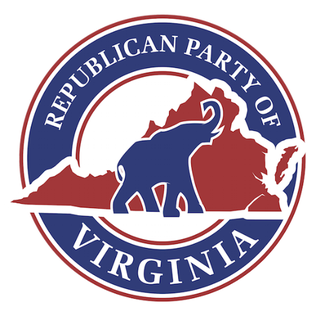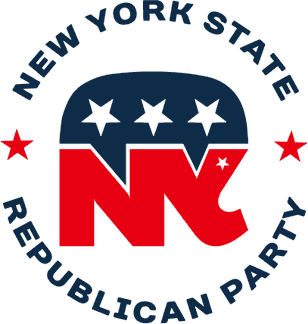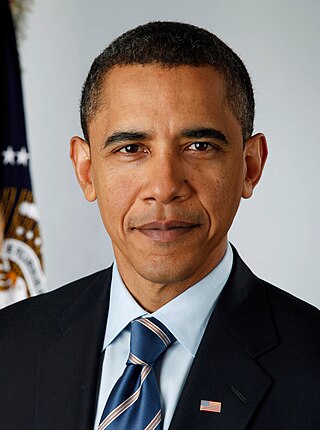
The Kansas Republican Party is the state affiliate political party in Kansas of the United States Republican Party. The Kansas Republican Party was organized in May 1859.

The Florida Democratic Party is the affiliate of the Democratic Party in the U.S. state of Florida, headquartered in Tallahassee. Former Commissioner of Agriculture Nikki Fried is the current chair.

The Republican Party of Virginia (RPV) is the Virginia chapter of the Republican Party. It is based at the Richard D. Obenshain Center in Richmond. As of May 2024, it controls all three statewide elected offices and 5 out of 11 U.S. House seats.
The California Republican Party (CAGOP) is the affiliate of the United States Republican Party in the U.S. state of California. The party is based in Sacramento and is led by chair Jessica Millan Patterson.

The Utah Republican Party is the affiliate of the Republican Party in the U.S. state of Utah. It is currently the dominant party in the state, and has been for almost all of its history. It currently holds Utah's entire congressional delegation, all statewide executive offices, and supermajorities in both state legislative chambers.

The results of elections in the state of New York have tended to be more Democratic-leaning than in most of the United States, with in recent decades a solid majority of Democratic voters, concentrated in New York City and some of its suburbs, including Westchester County, Rockland County and Long Island's Nassau county, and in the cities of Buffalo, Rochester, Syracuse, Albany, and Ithaca.
The Alabama Democratic Party is the affiliate of the Democratic Party in the state of Alabama. It is chaired by Randy Kelley.

The 2008 Iowa Democratic presidential caucus occurred on January 3, and was the state caucuses of the Iowa Democratic Party. It was the first election for the Democrats of the 2008 presidential election. Also referred to as "the First in the Nation Caucus," it was the first election of the primary season on both the Democratic and Republican sides. Of the eight major Democratic presidential candidates, then-U.S. Senator Barack Obama of Illinois received the most votes and was ultimately declared the winner of the Iowa Democratic Caucus of 2008, making him the first African American to win the caucus and the first African American to win a primary state since Jesse Jackson in 1988. Former U.S. Senator John Edwards of North Carolina came in second place and then-U.S. Senator Hillary Clinton of New York finished third, though Clinton received more delegates than Edwards. Campaigning had begun as early as two years before the event.

The Democratic Party of Oregon is the Oregon affiliate of the Democratic Party. The State Central Committee, made up of two delegates elected from each of Oregon's 36 counties and one additional delegate for every 15,000 registered Democrats, is the main authoritative body of the party. The party has 17 special group caucuses which also each have representation on the State Central Committee.

The Democratic Party of Indiana is the affiliate of the Democratic Party in the U.S. state of Indiana.
The Iowa Democratic Party (IDP) is the affiliate of the Democratic Party in the U.S. state of Iowa.

The Kentucky Democratic Party is the affiliate of the Democratic Party in the U.S. state of Kentucky. It is currently the minority party in the state, as the rival Republican Party of Kentucky overwhelmingly dominates in the state legislature, congressional delegation, and presidential elections. However, the party does currently control the governorship and lieutenant governorship, and maintains some strength in local elections.
The Texas Democratic Party is the affiliate of the Democratic Party in the U.S. state of Texas and one of the two major political parties in the state. The party's headquarters are in Austin, Texas.

The Maine Republican Party is an affiliate of the United States Republican Party in Maine. It was founded in Strong, Maine, on August 7, 1854. The party currently does not control the governor's office or either chamber of the Maine Legislature, nor either of Maine's two U.S. House seats and only controls one of the state's U.S. Senate seats.

The New York Republican State Committee, established in 1855, is the New York State affiliate of the United States Republican Party (GOP). The party has headquarters in Albany, Buffalo, and New York City. The purpose of the committee is to nominate Republican candidates for election to New York and federal political roles. It also assists its nominees in their election campaigns.

The 2008 United States presidential election in Iowa took place on November 4, 2008, as part of the 2008 United States presidential election. Voters chose seven representatives, or electors to the Electoral College, who voted for president and vice president.

The 2008 United States presidential election in Washington took place on November 4, 2008, and was part of the 2008 United States presidential election. Voters chose 11 representatives, or electors to the Electoral College, who voted for president and vice president.

The 1958 United States Senate election in Utah was held on November 4, 1958.

The 2014 United States elections were held on Tuesday, November 4, 2014, in the middle of Democratic President Barack Obama's second term. A typical six-year itch midterm election suffered by most second-term presidents, the Republican Party retained control of the House of Representatives and won control of the Senate, while furthering their gains in the governorships and state legislatures. Because of these Republican gains, the election was commonly cited as a "red wave" election.
The Count My Vote initiative was a 2014 Utah citizens' initiative measure which proposed to replace the state's caucus selection process for candidates for public office with a mandatory primary election. The initiative sponsors' stated purposes were to increase civic engagement and voter participation. The text of the Count My Vote initiative was incorporated into Senate Bill 54 by the Utah State Legislature—along with an option for a dual-path nominating process involving conventions and/or petitions—and this bill was signed into law by Governor Gary Herbert in March 2014. The constitutionality of this law is currently being challenged in federal court by the Utah Republican Party and the Utah Constitution Party, which wish to continue using the caucus system to qualify their party's candidates.














